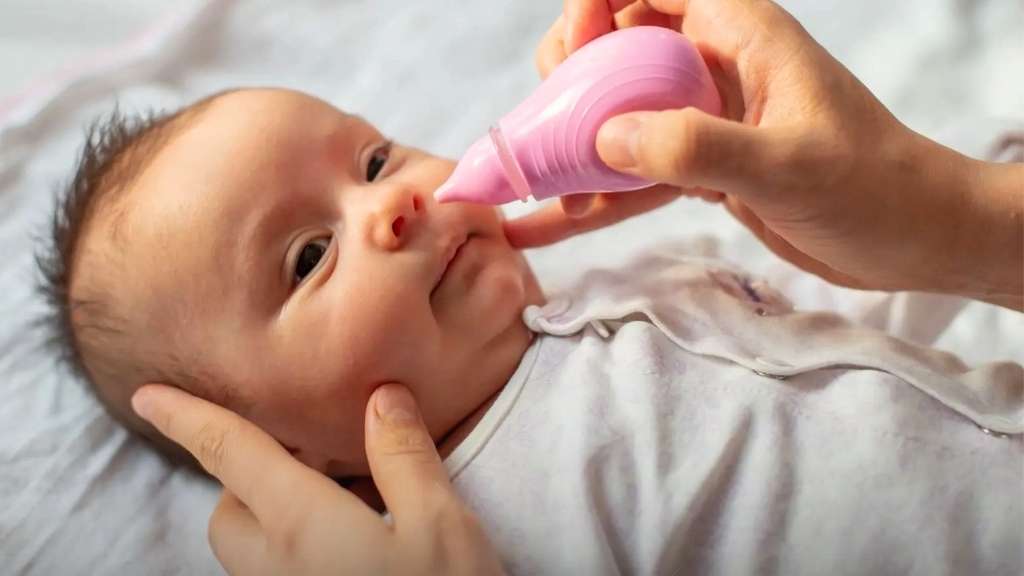
Table of Contents
Hey there, brave parents! We get it, having a sniffling, sneezing, and coughing baby is like dealing with a tiny, adorable germ factory. But fret not, because, there are some secret spells to help your little one conquer the common cold!
First off, think of this like a hydration challenge – the more fluids, the better. We’re talking H2O, juice, or even an electrolyte solution. And for that stuffy, nose-blocked fortress, grab your trusty aspirator to clear the path. We’ve got a couple of unconventional weapons up our sleeves too, like honey-infused warm water and the legendary chicken soup (yes, it’s soup-er effective!)
Bedtime? Cue the mentholated rub (for ages 2 and up) and the nasal strips. Also, teach your older baby to blow their nose, gargle, and even master a neti pot. Remember, when it comes to home remedies for cold in babies, you don’t always have to play the remedy card; sometimes, letting nature do its thing and showering your tot with heaps of TLC can work like a charm.
Also read: How long does a cold last in toddlers?
Diagnosis of Cold in Babies
If your little one is under 3 months old and seems sick, it’s a good idea to call their doctor early. This way, the doctor can check if there’s something more serious going on, especially if your baby has a fever. For older babies with a regular cold, you usually don’t need to rush to the doctor. But if you’re worried or if your baby’s not getting better, it might be time to see the doctor.
The doctor can usually tell if it’s just a cold by looking at your baby and their symptoms. If they think there might be something else going on, they might do some tests like a chest X-ray, just to make sure it’s not something more serious. So, don’t hesitate to reach out to your doctor if you have concerns about your little one’s health.
Chilly-Willy's Cold-Busting Tricks for Your Little One
Top 12 Home Remedies For Cold in Babies
The American Academy of Pediatrics advises against using most over-the-counter cough and cold medicines for kids under 6, except for basic acetaminophen and ibuprofen. But don’t worry, you can still give your little one some love and relief when they’re not feeling well. Try these five gentle and natural home remedies for your baby’s cold, and remember to consult your pediatrician if needed.
1. Hello, Neti Pot!
During the first six months of their life, babies usually breathe through their noses. If your baby has a stuffy nose, it can be tough for them. You can use a special rubber syringe to suck out the yucky stuff from their nose. Sometimes, the regular blue syringe is too big for tiny noses, so try a smaller one made for ears.
Here’s how to do it:
- Squish the rubber part to get rid of the air.
- Put it gently in your baby’s nose.
- Aim it a bit downward, not straight in.
- Let go of the rubber part.
- Take it out, and the mucus should come out too.
If you want more help, you can use a special salty water spray to make the yucky stuff looser first.
- Lay your baby down.
- Put a few drops of salty water in each nostril, just like the instructions on the bottle say.
- Then use the rubber syringe to clean their nose.
2. H2-Oh-So-Good Liquids: Hydrate, Baby!
Just like grown-ups, babies may not want to eat when they’re not feeling well. But it’s important to gently encourage your little one to nurse or have their bottle as much as they can.
If your baby refuses milk, talk to your doctor to make sure they stay hydrated. You could also ask if it’s okay to give them a special drink with electrolytes. Home remedies for cold in babies include feeding your baby while they’re sitting up a bit, which can also help with stuffy noses and stop mucus from going down their throat when they drink.
3. Hot Shower Steaming
Babies don’t have strong muscles to cough well, and that can make it hard for them to clear mucus. Here’s a gentle trick:
- Take your sweet baby into the bathroom.
- Turn on the shower to make the air warm and steamy.
- Then sit with your little one for 10 to 15 minutes.
- Bring toys or books to keep them busy.
This cozy, damp air will help your baby’s nose run and loosen the yucky stuff in their throat, making coughs work better. It’s nice to try it before bedtime, as mucus often flows down into their throat and chest when they’re lying down. It also helps them sleep better.
Also read: When do babies sleep through the night?
4. Rasie The Humidity
Adding a cool-mist humidifier to your baby’s room when they sleep or nap is a wonderful way to help them when they have a cold. Humidifiers add moisture to the dry air, and this can make it easier for your baby to breathe and reduce coughing. Here’s what we recommend:
- Make sure the humidifier is not in your baby’s reach.
- Fill it with fresh water daily.
- Clean it regularly to prevent mold.
- Also, if your home heating is on, avoid turning it up too high because that can make your baby’s congestion worse.
5. Chicken Soup Magic
You know what? Grandmas had it all figured out: Chicken soup is like a cozy hug for your body. Science says it does some really cool stuff. It’s full of good things from chicken and veggies that can calm the yucky stuff that makes you feel bad when you have a cold.
Plus, when you sip that warm soup, it can make your nose feel less stuffy and help get rid of the mucus. If your little one is just starting to eat solid foods, you can blend the soup to make it super smooth or just use the yummy broth. So, next time you’re looking for home remedies for cold in babies, remember, a bowl of chicken soup might be just what you need
6. Clear Out the Smoke
Here’s another important reason to avoid secondhand smoke around children: It can make their colds even worse by irritating their throats and nose. In fact, kids who breathe in this smoke have a tougher time recovering from colds. They’re also at a higher risk of getting bronchitis or pneumonia. To protect your little ones, keep them away from places where people smoke, and kindly request that no one smokes inside your home. Let’s keep the air around them clean and healthy.
7. Nap It Out!
Sleep is super important for a strong immune system in your little one. It helps them fight those yucky cold germs. To make sure they sleep well, use saline drops and a little bulb thingy to clear their stuffy nose before naps and bedtime. And don’t forget to give them plenty of warm cuddles
8. Try a Sponge Bath
When your little one has a fever, a warm and loving sponge bath can work wonders. It’s simple:
- Get a shallow tub and put in some comfortably warm water, just an inch or two deep.
- Then, take a soft sponge or washcloth and gently wipe their tiny body.
- Remember, never use cold water, ice, or alcohol.
- If they start feeling too cold during the bath, just take them out and wrap them up warmly.
Your baby will feel better with your tender touch.
Also read: 10 best baby bathtubs
9. Offer Healthy Foods
You know the saying “feed a cold, starve a fever”? Well, it’s kind of right, but not completely. When your little one has a cold, they actually need food to give them energy to fight it off. Certain foods can also make their immune system stronger. If your baby is already eating solid foods, try to give them meals with protein, veggies, and good fats. And if you’re breastfeeding, that’s awesome – because breastmilk helps protect your baby from the germs that can give them a cold. So, keep nourishing with healthy food as one of the perfect home remedies for cold in babies!
10. Give an Older Baby Some Honey Hugs
If your little one is older than a year, giving them a spoonful of honey before bedtime can help ease their cough and make their sleep more peaceful. A study even showed that when sick children had a teaspoon and a half of honey, they coughed less and slept better.
However, it’s important not to give honey to babies under the age of 1. This is because it’s not safe for very young babies and could make them sick with a serious illness called botulism. So, remember to wait until they’re a bit older before sharing the golden goodness of honey with them, with lots of love.
When to Visit the Doctor?
If your baby is under 3 months and has a fever above 100.4 degrees Fahrenheit, you should call your doctor right away. For older babies, if the fever lasts more than three days or appears after a few days of cold symptoms, it’s a concern. Watch out for wheezing, fast, labored breathing, which could mean a virus or pneumonia.
Generally, antibiotics aren’t needed unless congestion leads to an ear infection or pneumonia. But if your baby’s fever continues for more than three days or symptoms worsen instead of improving, it’s time to see the pediatrician.
A Note From Parenthoodbliss
So there you have it, a treasure chest of home remedies to help your little one sail through the stormy seas of a cold! From cozy steamy baths to the magic of honey and ginger, these tricks will make your baby’s sniffles vanish like a magician’s act.
Remember, while these home remedies for cold in babies are like your secret weapons, always keep an eye on your baby’s symptoms and if you’re ever in doubt, Captain Pediatrician is just a phone call away. With these tips and a little TLC, your baby will be back to giggles and play in no time. Wishing you and your tiny human smooth sailing and sunny skies ahead!











